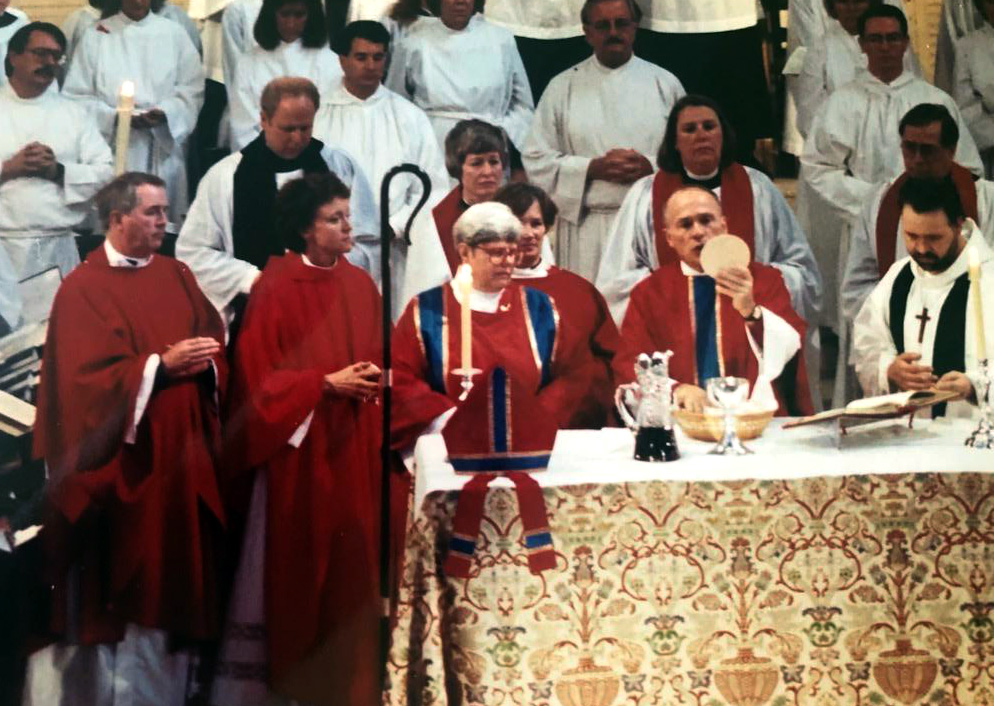She is a Priest

My mother was ordained an Episcopal priest on January 15, 1994, at All Saints’ Episcopal Church in Beverly Hills. I was ten years old, and her being ordained wasn’t odd to me in the slightest. I’d watched for years as my mother juggled family life and seminary, pool days, and bedside hospital visits–a delicate balancing act of a woman called to be a priest and a mother who ferociously loved her two young children. Her being ordained a priest was what came next, right?
It didn’t take long after my mother’s ordination to find out that her being a priest was not ‘normal’ to a lot of people.
Twenty years earlier, on July 29, 1974, at the Church of the Advocate in Philadelphia, eleven women became the first female priests in the Episcopal Church. This historic move was orchestrated by three retired bishops—Daniel Corrigan, Robert L. DeWitt, and Edward R. Welles II—who, acting out of deep conviction and a sense of justice, defied the church’s official stance that barred women from the priesthood.
The impact of the Philadelphia Eleven’s ordination was immediate–both intense opposition and widespread support spread through the Church. Initially, the Episcopal Church declared their ordinations invalid, maintaining that church law had been breached. However, the courageous act of these women and the bishops who ordained them ignited a crucial dialogue about inclusivity and justice within the church. Their ordination was the catalyst for change.
In 1976, just two years after the ordination of the Philadelphia Eleven, the General Convention of the Episcopal Church officially sanctioned the ordination of women, forever opening the doors for countless women to follow in their footsteps.
But neither I, at ten, nor the neighborhood kids knew all this. Somehow, the subject came up, and our roller hockey game skidded to a halt, “Girls can’t be priests,” said the neighborhood boys.
“Well, my mom is.” I responded defensively while questioning my lived reality. The other boys were so certain… I didn’t change any minds that day, but the truth remains–my mother is a priest.
In the mid-90s, the idea of a woman being a priest was still new. Our next-door neighbor, Nancy, went door to door on our culdesac and explained the accomplishment to our neighbors. Everyone on the block signed a card, but I can imagine the looks of confusion on some of my neighbors’ faces while Nancy described my mother’s ordination.
Today, the legacy of the Philadelphia Eleven is one of bravery, resilience, and transformative impact. Their courage paved the way for generations of women clergy in the Episcopal Church. But it also underscored the importance of standing up for what is right, even in the face of institutional resistance.
The ordination of the Philadelphia Eleven was not just a milestone for the Episcopal Church; it resonated throughout broader movements for gender equality and civil rights of the 1970s. Their ordination coincided with a period of significant social upheaval and change in the United States, where issues of gender, race, and equality were being intensely debated and redefined. By stepping into roles that had been exclusively male, these women challenged religious norms and contributed to the larger narrative for equal opportunities in all spheres of life. Their bravery and resolve became a symbol of the broader fight against discrimination, inspiring many beyond the walls of the church.
In the decades since, the influence of the Philadelphia Eleven has continued to ripple through the Episcopal Church and other religious communities. Their story has been a beacon of hope for many who feel called to ministry but face significant barriers. The increase of women in clergy roles has unquestionably enriched the Church.
Thank you, Merrill Bittner, Alison Cheek, Emily Hewitt, Alla Bozarth-Campbell, Carter Heyward, Suzanne Hiatt, Marie Moorefield Fleischer, Jeannette Piccard, Betty Bone Schiess, Katrina Swanson, and Nancy Hatch Wittig, for paving the way for countless women, like my mother, to share the love of Christ with the people as priests.
In the Episcopal Diocese of San Diego, you do not need to look far to see the impact of female clergy. In 2005, over 30 years after the ordination of the Philadelphia Eleven, only five congregations were led by women in EDSD. Today, in 2024, over half of the churches in the Episcopal Diocese of San Diego have had a woman rector or vicar at one point in their history. And over 30% of EDSD’s congregations are actively led by women today.
Whether you look to examples like Bishop Susan Brown Snook, the first female diocesan bishop in San Diego, Dean Penelope Bridges, the first female dean of St. Paul’s Cathedral in San Diego, or any of the other incredible female leaders in our diocese, it is clear that our Church would be less without their voices and leadership.
Today, it’s not so rare to meet a woman who is a deacon, a priest, or a bishop.
…and that makes me happy.